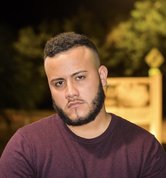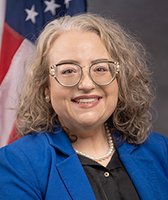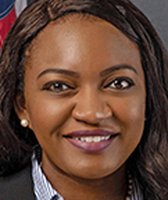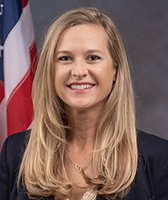Stand up for the facts!
Our only agenda is to publish the truth so you can be an informed participant in democracy.
We need your help.
I would like to contribute
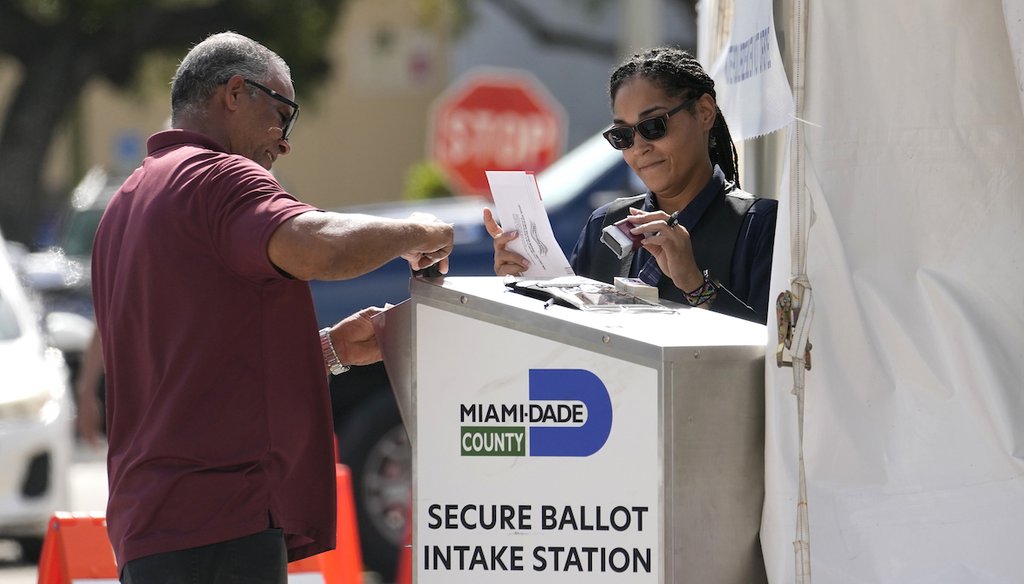
Employees process vote-by-mail ballots for the midterm election at the Miami-Dade County Elections Department, Nov. 8, 2022, in Miami. (AP)
Justice Department election monitors traveled to voting sites in 24 states on Election Day to watch for violations of federal voting laws.
Florida did not welcome them. State officials blocked federal lawyers from going inside polling sites in three south Florida counties. Florida Secretary of State Cord Byrd, whom Gov. Ron DeSantis appointed, said their presence would "undermine confidence" in the state's election.
Florida's move followed a similar refusal from the Missouri secretary of state, who posted screenshots of emails from the Justice Department on Twitter and called the request to visit polling locations "overreach."
That rhetoric trickled to social media users, who called the decision to monitor Florida's election the Biden administration's "last-ditch plan to intimidate" voters.
"Joe Biden tried to send federal Gestapo agents to Florida to 'monitor' our elections," tweeted Benny Johnson, a conservative media personality. "No reason given. Just federal agents in polling places. Totally normal!"
Sign up for PolitiFact texts
But monitoring polling places for compliance with federal law is not new.
Florida's issue had more to do with federal workers being inside polling places in Broward, Palm Beach and Miami-Dade counties, which had happened before the pandemic forced election monitors outside.
The Justice Department declined to comment on the situation in Florida.
Federal monitors have visited polling places across the nation since the passage of the Voting Rights Act of 1965, according to the Justice Department. The program is designed to prevent voter suppression based on race, national origin or religion.
The department's Civil Rights Division monitors compliance with several voting laws, making sure poll workers assist voters with disabilities, provide election materials in different languages and help people who have difficulties reading and writing.
Beyond the department's Civil Rights Division, monitors also work in U.S. attorneys' offices. They are not law enforcement or federal agents; they don't access ballots or voting machines.
The department has previously monitored voting in some Florida counties, including during the 2018 midterm and 2020 presidential elections under former President Donald Trump.
The department said Nov. 7 that it would monitor 64 cities and counties nationwide. In Florida, it chose Broward, Miami-Dade and Palm Beach counties.
Florida did not allow monitors to enter voting sites
In a letter to the Justice Department, Florida election officials said monitors are "not permitted inside a polling place under Florida law." Byrd's letter cited state statutes listing the people allowed to enter voting sites, including voters, clerks, law enforcement and emergency personnel.
"Department of Justice personnel are not included on the list," the letter read. "The presence of federal law enforcement inside polling places would be counterproductive and could potentially undermine confidence in the election."
In a Nov. 4 letter, the Justice Department responded to Broward County Elections Supervisor Joe Scott's request for additional information on the monitoring program.
"The Department of Justice has sent trained Civil Rights Division staff members to Florida and other jurisdictions during elections in years past," the department wrote. "Staff members also do not interfere in the voting process."
It also said monitors do not wear anything to signal that they are with the federal government and introduce themselves to the lead poll worker when they arrive at a polling place.
When asked about the refusal, Byrd said the department did not ask to enter polling places in 2020 and could monitor sites from outside.
Election officials for Miami-Dade county did not respond to PolitiFact's request for comment. Alison Novoa, a spokesperson for the Palm Beach Supervisor of Election, confirmed monitors did not come on-site in 2020.
Byrd told reporters that in the past, some Florida counties had consented to federal monitors entering polling locations, but he said such agreements had expired.
"Both the state of Missouri and the state of Florida, when they told us they wanted to go into our polling places, we wanted to make it clear that those are places for election workers and for voters — not for anyone else," Byrd said Nov. 8.
Kendall Coffey, a former U.S. attorney in Miami now in private practice, told PolitiFact that without an interagency agreement or court order, a monitor's presence inside a polling location is up to the discretion of state election officials.
"Much is unsettled, but it is largely for state and local authorities to conduct elections in Florida and to monitor state election laws," Coffey said. He noted that an armed federal agent at a voting site would raise legal questions, but a monitor "should seemingly not be objectionable."
The Justice Department could not point to legal precedent that gave election monitors the right to enter a voting site without state officials’ consent or a court order.
Scott told CNN the state’s denial surprised him, but that the department's monitors complied with the request to remain outside of voting sites.
"We try to work well with the secretary of state’s office," he said. "The DOJ people were understanding as well. We're not trying to pick a fight."
Our Sources
The U.S. Department of Justice, Justice Department to Monitor Polls in 24 States for Compliance with Federal Voting Rights Laws, Nov. 7, 2022
The U.S. Department of Justice, Justice Department Again to Monitor Compliance with the Federal Voting Rights Laws on Election Day, Nov. 2, 2020
Florida Department of State, Re: U.S. Department of Justice ("DOJ") Election Monitoring Program in Florida, Nov. 8, 2022
CNN, Florida warns US Justice Department that federal election monitors are not allowed inside polling places, Nov. 8, 2022
Phone interview with Broward County Supervisor Joe Scott, Nov. 9, 2022
Email interview with Kendall Coffey, a former U.S. attorney in Miami now in private practice, Nov. 9, 2022
Email interview, Ivan Castro, Broward Supervisor of Elections spokesperson, Nov. 8, 2022
Email interview, Suzy Trutie, Miami-Dade Supervisor of Elections spokesperson, Nov. 8, 2022
Email interview, Alison Novoa, Palm Beach Supervisor of Elections spokesperson, Nov. 8, 2022
Email interview, Jennifer Garrett, Media Specialist for the American Civil Liberties Union of Florida, Nov. 8, 2022
Email interview, Aryele Bradford, spokesperson for the U.S. Department of Justice, Nov. 8, 2022
Email interview, Mark Ard, spokesperson for the Florida Department of State, Nov. 8, 2022
